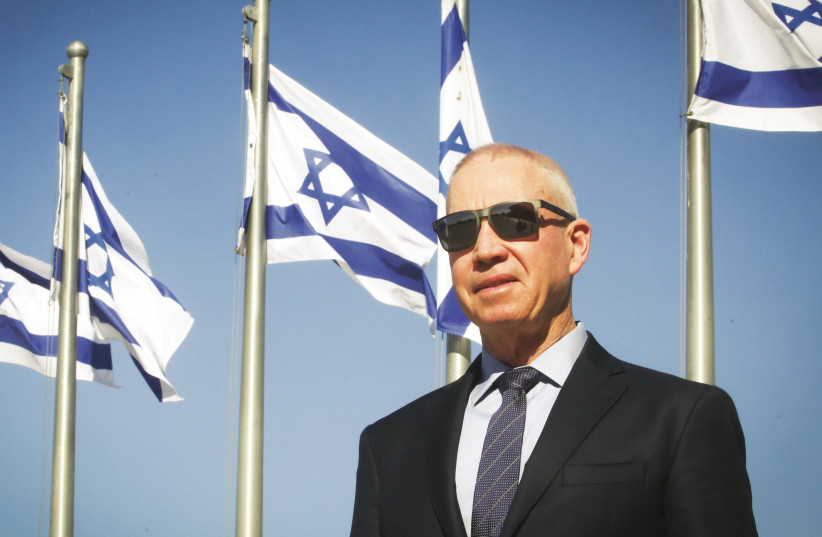Israel Remembrance Day: Politicians to attend services - Gallant

Government and Knesset representatives usually speak at ceremonies at military cemeteries throughout the country on Remembrance Day. The defense minister insisted that they speak this year as well.
Defense Minister Yoav Gallant insisted that ministers and MKs speak at official Remembrance Day services next week, despite a group of bereaved parents’ request that politicians refrain from speaking due to the social upheaval over the proposed judicial reform.
Gallant met on Tuesday with the Public Council for Commemorating Soldiers, whose members expressed their concern that politicians’ speeches will be disrupted. Government and Knesset representatives usually speak at ceremonies at military cemeteries throughout the country on Remembrance Day. The defense minister insisted that they speak this year as well, arguing that elected officials were a symbol of the state and that the demand to remove them was equivalent to a demand to remove the flag.
Politics must be separated from the issue of bereavement, Gallant said, adding that “we must not as a society lose one of our central social assets that serve as a bridge of unity, the IDF and security agencies, in general, and the bereaved families, in particular.”
Bereaved families demand Israeli lawmakers avoid cemeteries
The group of bereaved families that demanded that politicians avoid the cemeteries is called “With Their Death They Commanded,” short for the phrase “with their death they commanded us life,” but also short for the altered slogan “with their death they commanded us democracy,” which members of the group displayed at protests against the government’s judicial reform.
The group put out a statement criticizing Gallant’s comments.
“[Prime Minister Benjamin] Netanyahu, wake up! The defense minister does not understand the reality, and we expect Prime Minister Netanyahu to intervene in order to solve the issue,” it said.
“The decision to offend the bereaved families, to broaden the schism within bereaved families and to cause a desecration of Remembrance Day, all in the name of fake unity, is irresponsible, immoral and dangerous. Whoever wants to remove politics from Remembrance Day must send IDF officers to speak instead of insisting on politics and politicians entering the cemeteries.
“Ignoring the emotional turmoil in Israeli society and among thousands of bereaved families forces many families to make a vicious choice: Shout, avoid [the ceremony] or be a ‘captive audience’ for politicians, some of whom did not serve in the army and who routinely spread hate, incitement and divisiveness,” the group said, adding that it would continue fighting the decision, which “drives a wedge” between bereaved families.
The group sent a letter last week to Eli Ben-Shem, CEO of Yad Labanim, an organization that commemorates the memory of the fallen soldiers and cares for their families, warning that politicians’ presence at memorial ceremonies this year could lead to commotions and that for both the politicians’ and families’ sake, it was best that they stay away. More than 400 bereaved families signed the letter, but the group said it spoke in the name of thousands more.
Judicial reform negotiations proceed
Meanwhile, teams from the coalition and opposition parties Yesh Atid and National Unity held their second marathon negotiating session in as many days on Tuesday at the Waldorf Astoria Hotel in Jerusalem.
Team members from both sides remained tight-lipped about the contents of the meeting but a statement issued from the President’s Office on Monday evening indicated that Tuesday’s talks would focus on the formulation of Basic Law: The Legislature.
Coalition team member and Likud MK Keti Shitrit said after the meeting that she was “optimistic about the dialogue” and was “looking forward” to the next discussion.
“Especially on this important and sensitive day, we are headed towards the unity of the people,” she said.
Monday was the first time politicians from both sides sat down to discuss the actual content. Previous talks between the sides only focused on the organizational framework for the negotiations.
Jerusalem Post Store
`; document.getElementById("linkPremium").innerHTML = cont; var divWithLink = document.getElementById("premium-link"); if (divWithLink !== null && divWithLink !== 'undefined') { divWithLink.style.border = "solid 1px #cb0f3e"; divWithLink.style.textAlign = "center"; divWithLink.style.marginBottom = "15px"; divWithLink.style.marginTop = "15px"; divWithLink.style.width = "100%"; divWithLink.style.backgroundColor = "#122952"; divWithLink.style.color = "#ffffff"; divWithLink.style.lineHeight = "1.5"; } } (function (v, i) { });

